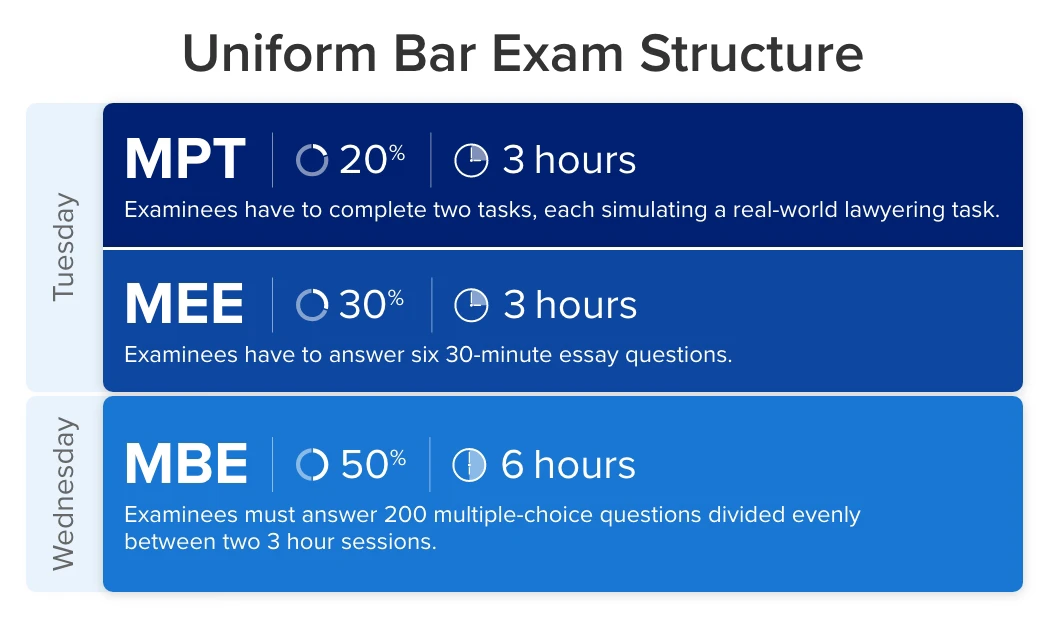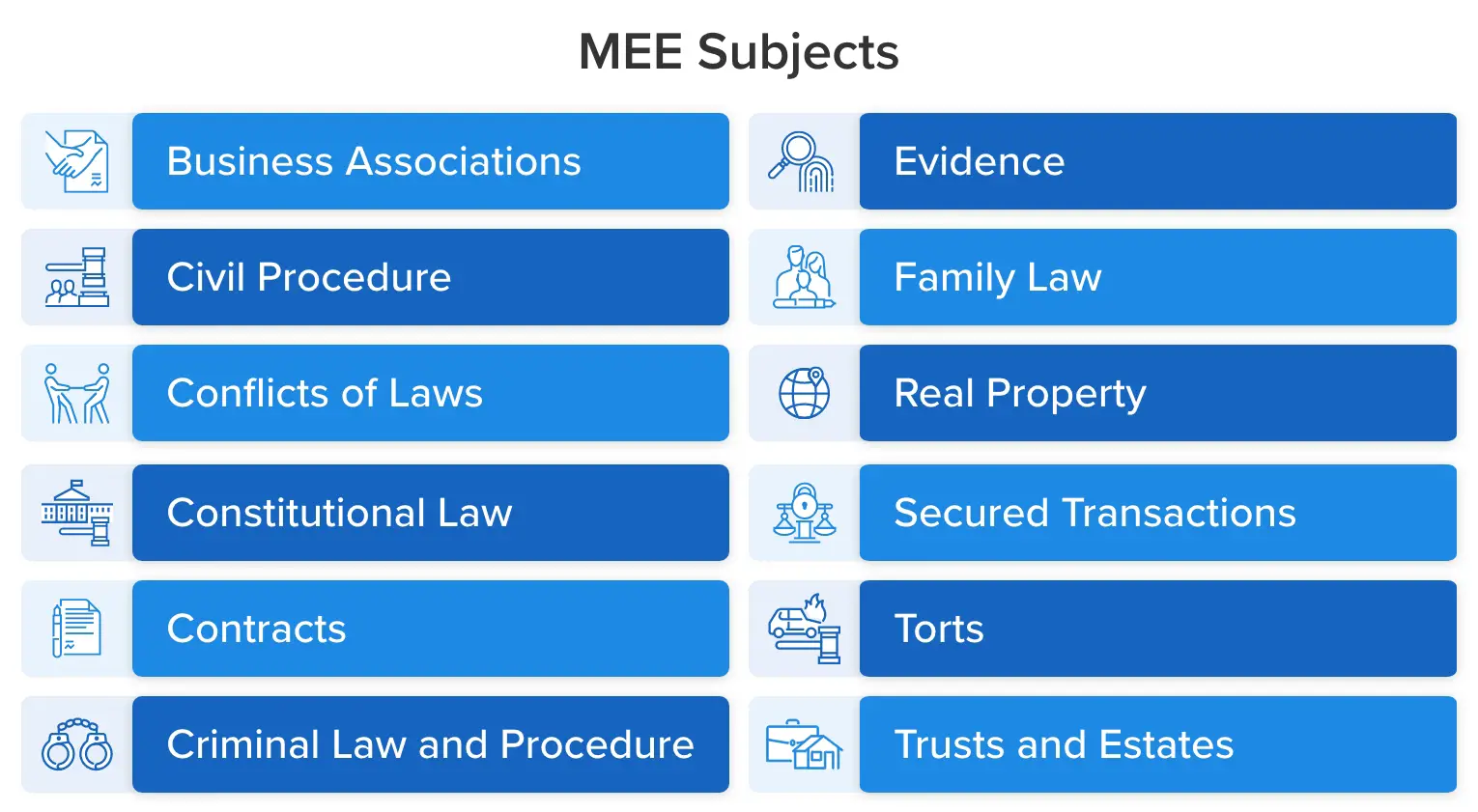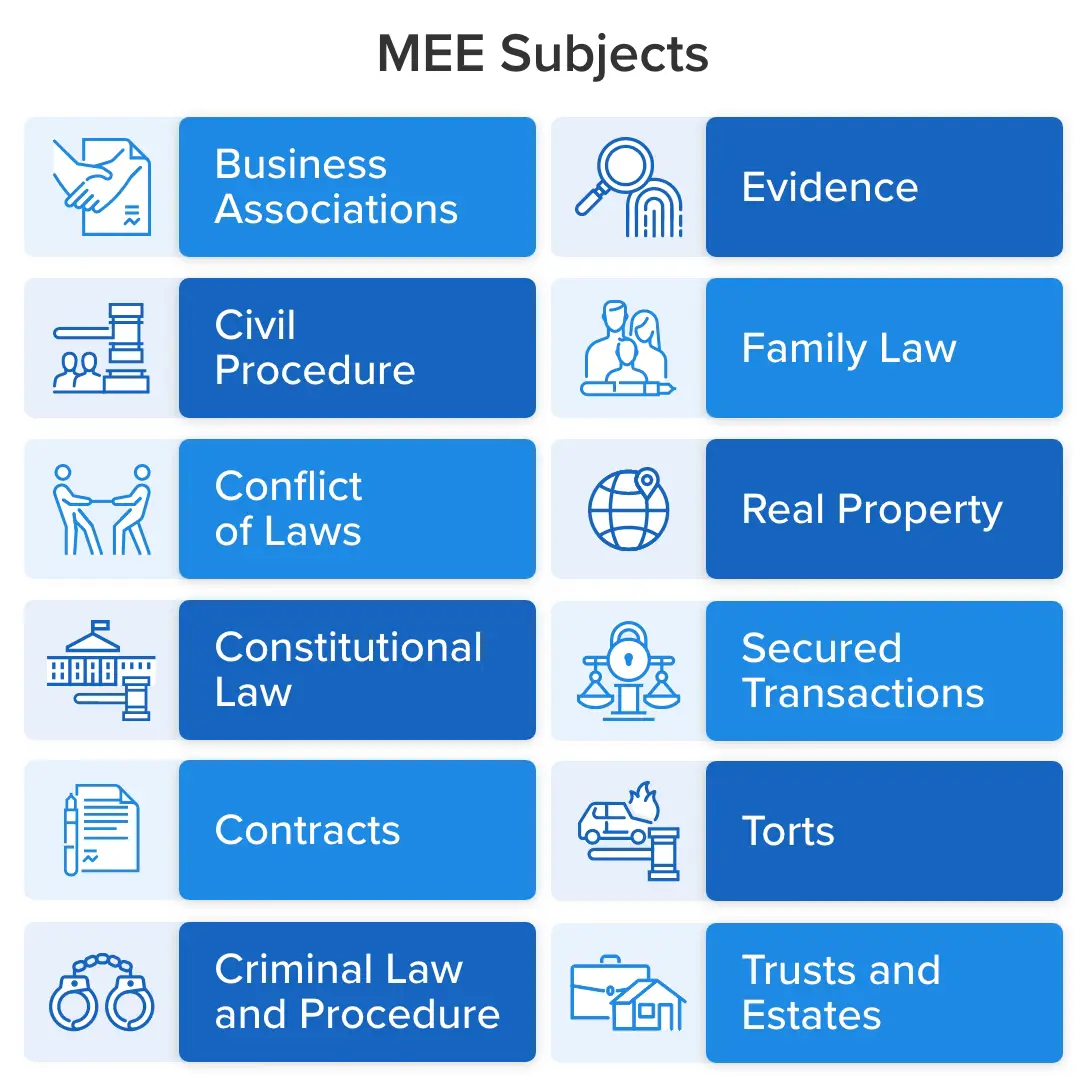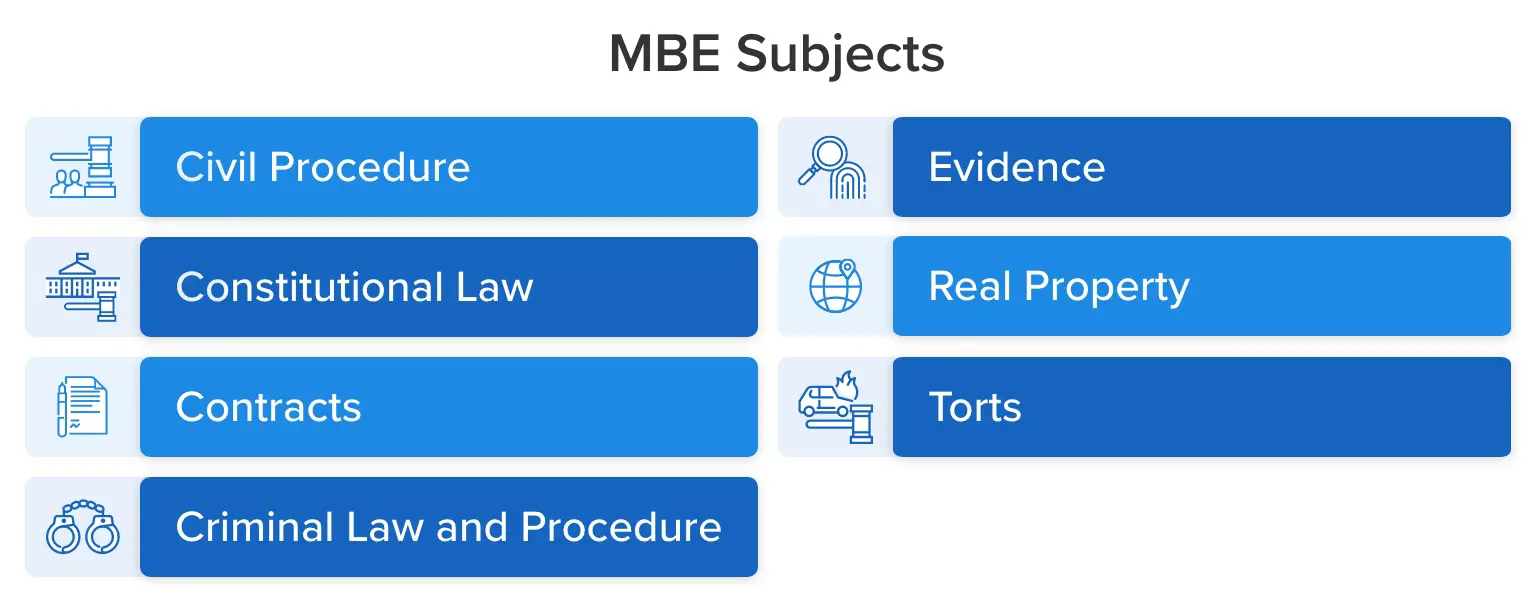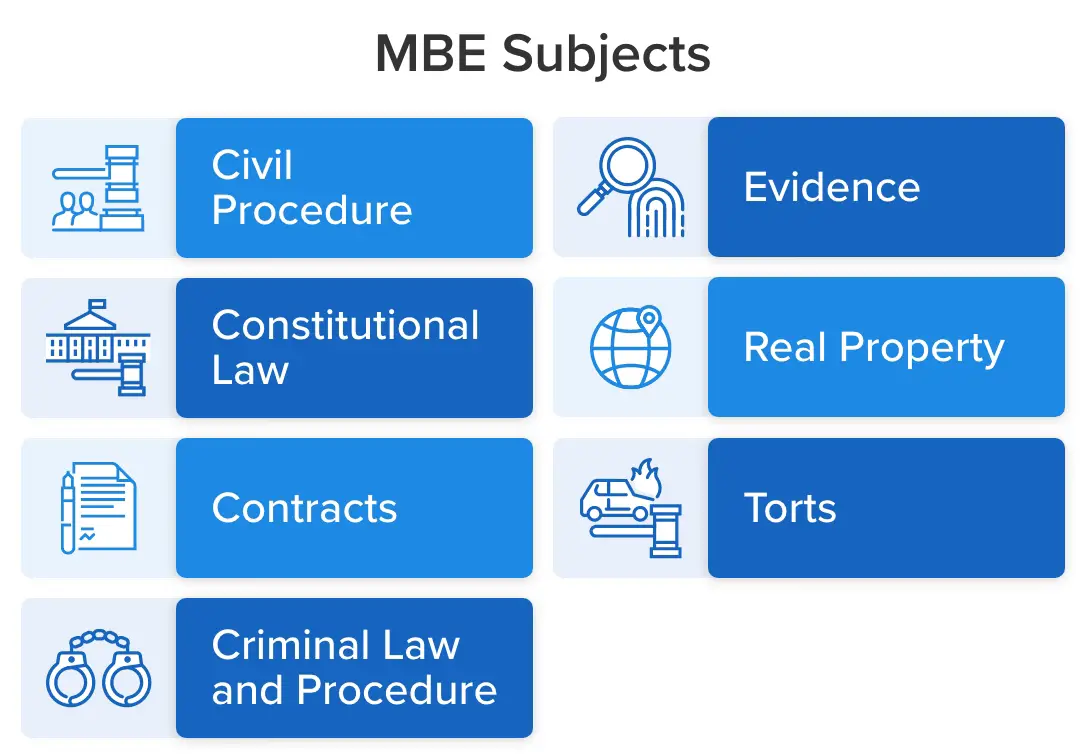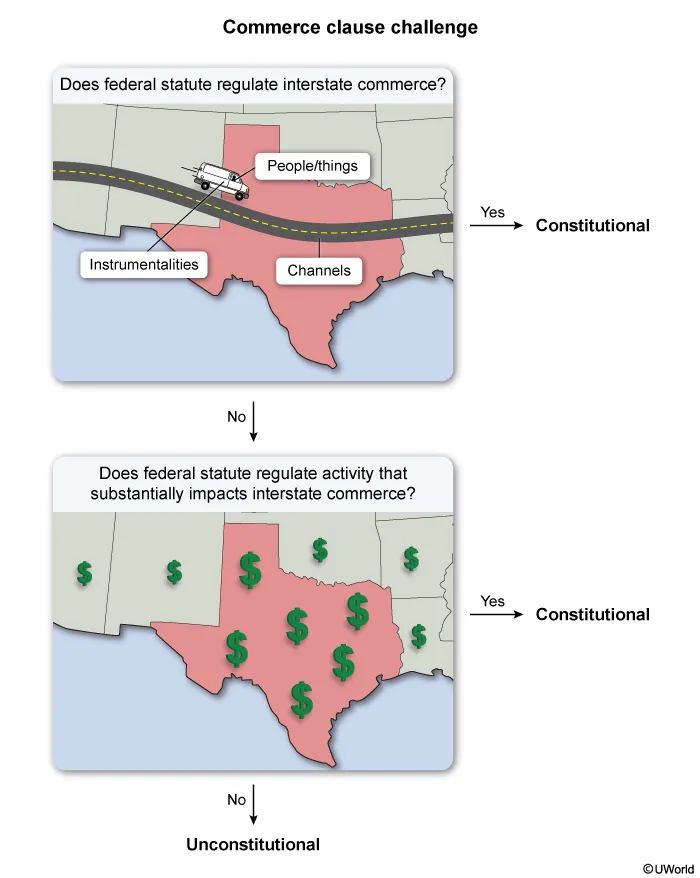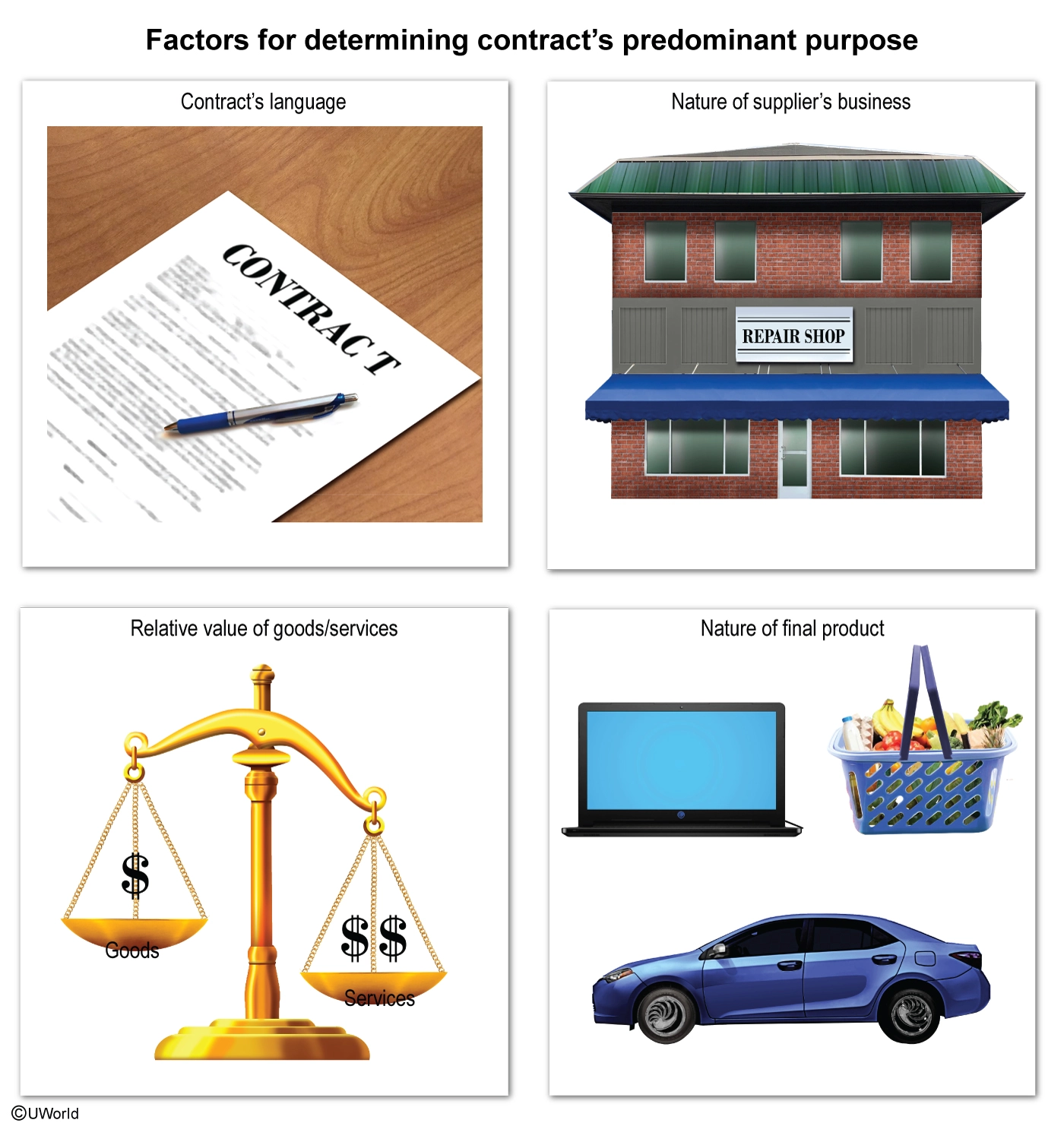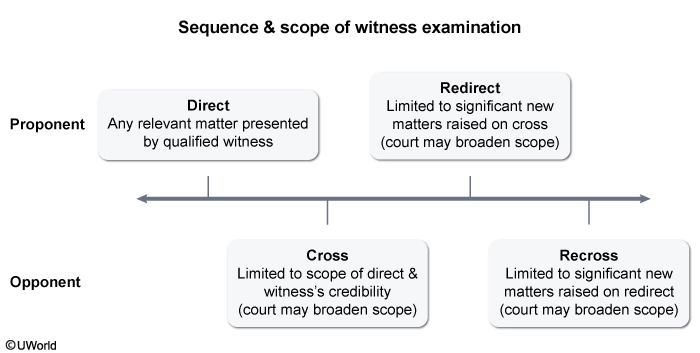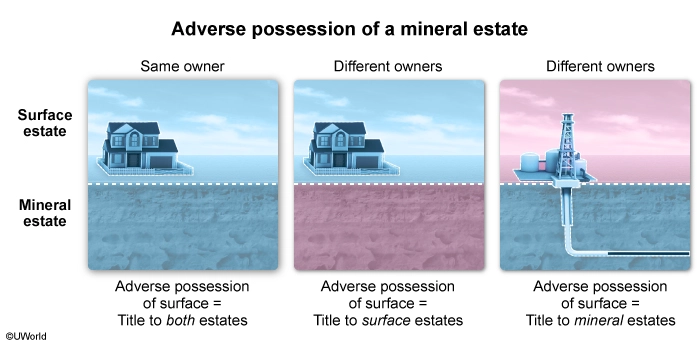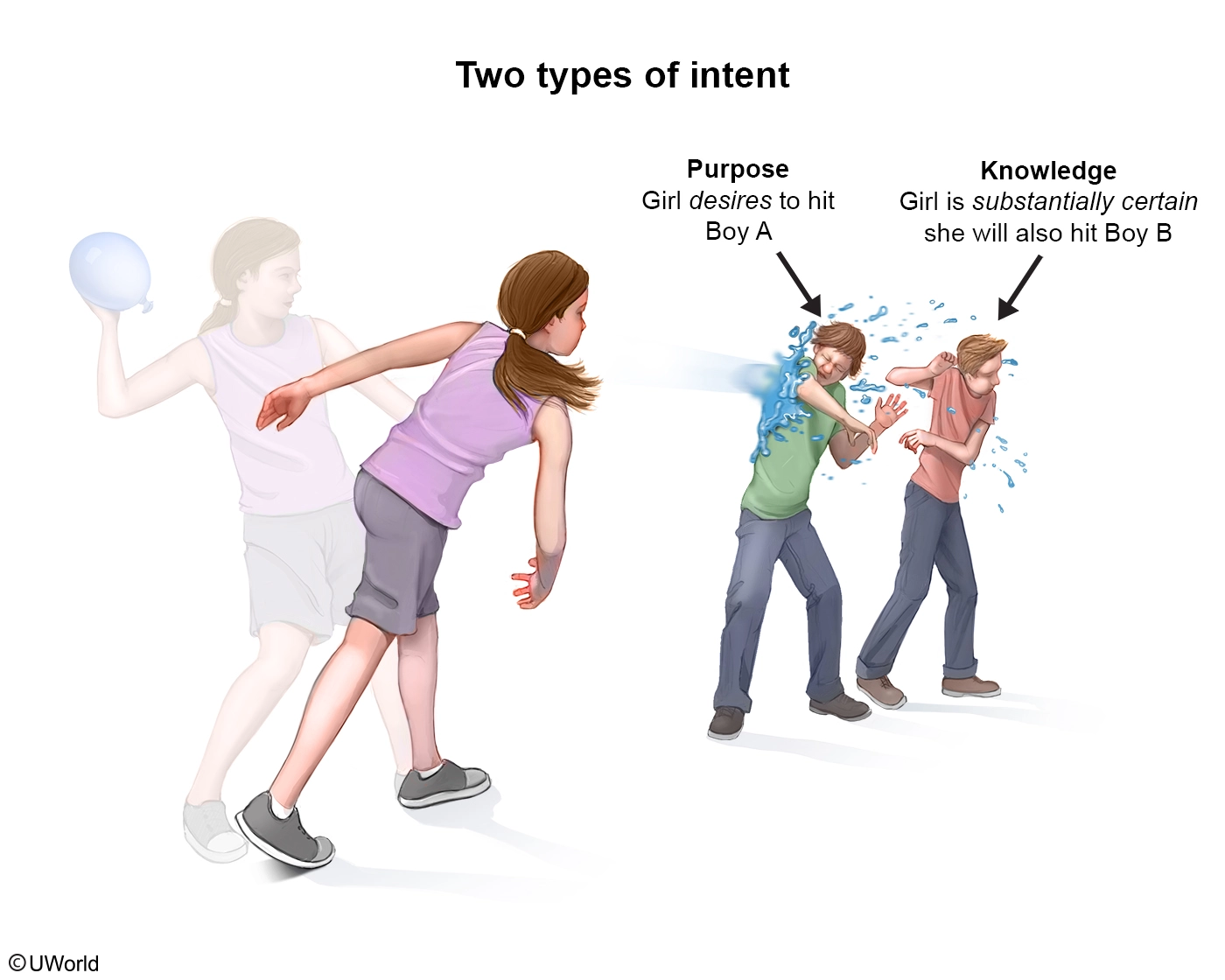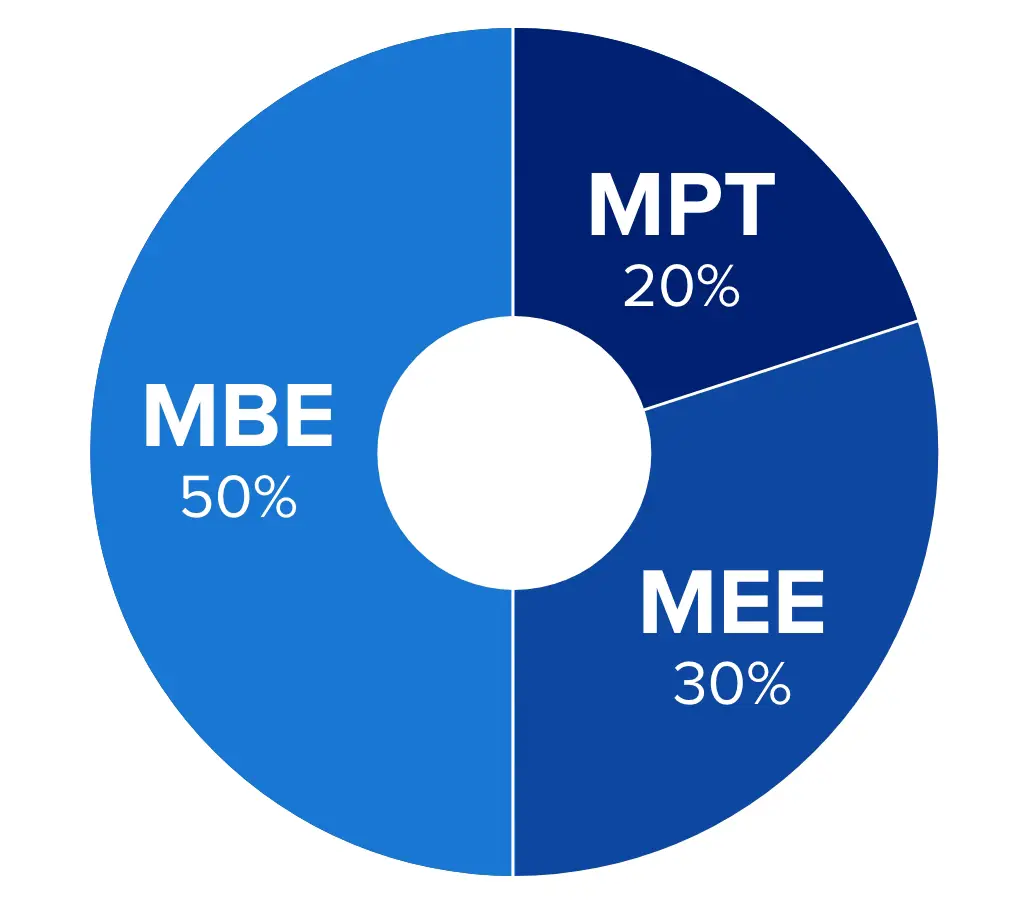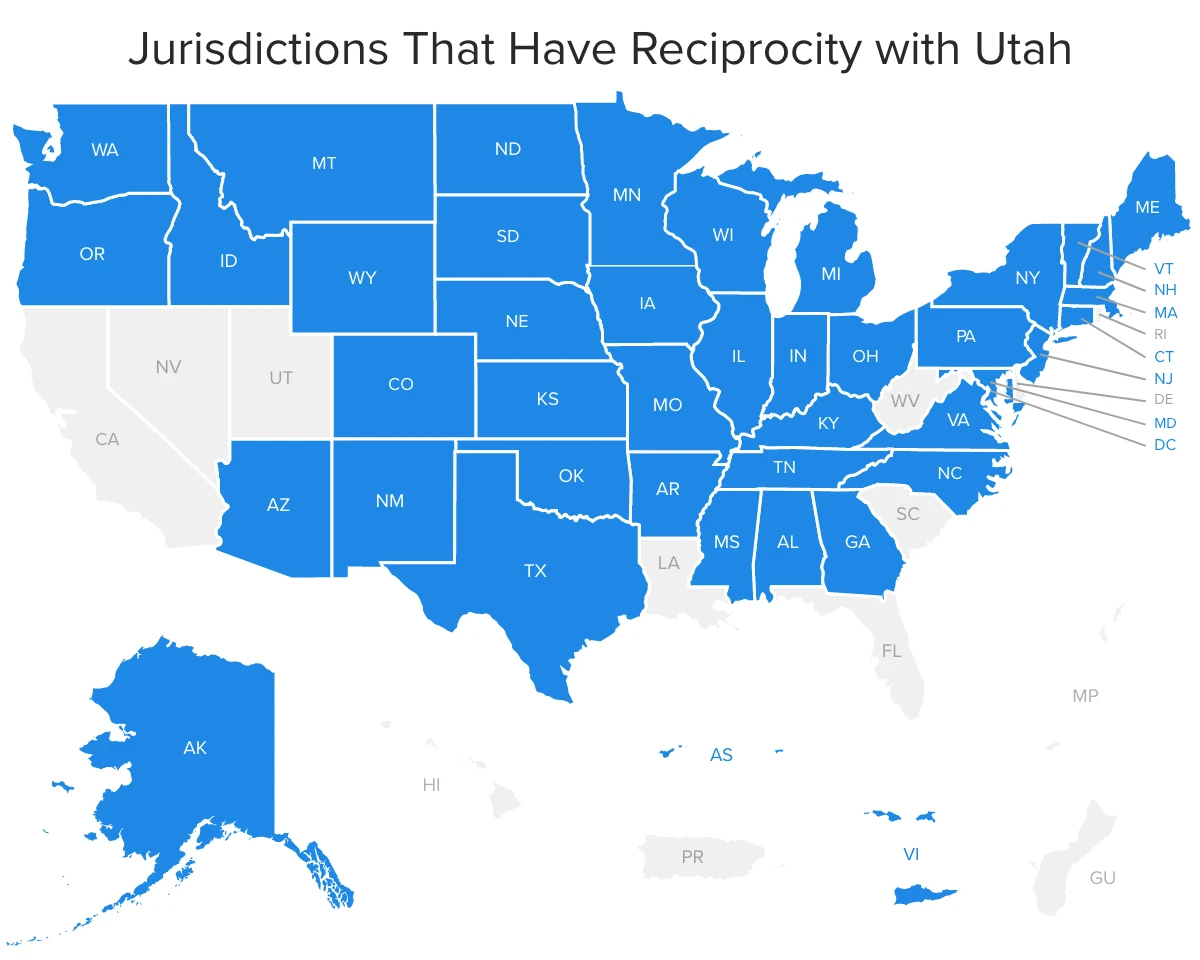The Utah Bar Examination adopted the Uniform Bar Examination (UBE®) format in February 2013. The National Conference of Bar Examiners (NCBE®) developed the UBE to assess a candidate's lawyering skills and legal knowledge. It consists of three components: the Multistate Bar Examination (MBE®), the Multistate Performance Test (MPT®), and the Multistate Essay Examination (MEE®).
On January 31, 2024, Utah announced that it will replace the UBE with the NextGen Bar Exam beginning July 2026.
Utah Bar Exam Structure
The writing portion of the UBE (MPT/MEE) is administered on the first day and the MBE on the second. Each day consists of 6 testing hours and is broken down as follows:
Utah Bar Exam Dates, Requirements, and Scheduling
You can't pass an exam that you don't take. That's why marking the filing dates on your calendar and reviewing eligibility requirements is essential. Gathering the proper documentation and submitting your application early can save you hundreds of dollars and a ton of stress. Check out all the details below.
Exam Dates
The Utah Bar Exam is administered on the last Tuesday and Wednesday of February and July. Applications, forms, and all required supplementary documentation must be submitted electronically by the end of the day (11:59:59 pm MDT) of the appropriate filing deadline. If the deadline is on a weekend or holiday, the deadline will be moved to the first following business day. Any hard copies of forms or documents must be delivered (not just postmarked) to the Bar's office by close of business on the appropriate filing deadline.
If you fail the Utah Bar Exam and wish to apply for the following administration, you must file a different application according to different submission deadlines. You will be notified of the deadline when scores are released.
| Filing Dates | Feb. 27-28, 2024 | July 30-31, 2024 | Fee |
|---|---|---|---|
| Application Opens | August 1, 2023 | January 1, 2023 | N/A |
| Timely Filing | October 1, 2023 | March 1, 2024 | $550 |
| Late Filing | October 15, 2023 | March 15, 2024 | +$100 |
| Timely Filing | November 1, 2023 | April 1, 2024 | +$300 |
Requirements
To sit for the Utah Bar Exam, you must have a Juris Doctorate (JD) degree from an American Bar Association (ABA)-accredited law school. You must also be a US citizen, a permanent resident, or otherwise authorized to work in the US. Additionally, all applicants must pass a character and fitness evaluation. If you have not graduated from a law school accredited by the ABA, you can still take the Utah Bar Exam if you meet the following two requirements:
- Graduated from a state-accredited law school with a curriculum deemed equivalent to an ABA-approved law school and not based on correspondence or online study.
- Have been practicing law lawfully for at least 10 of the 11 years preceding application submission.
Scheduling
Before you begin the scheduling process, review the requirements carefully, then follow these steps:
- Register for an account on the Admissions website.
- Review required application materials using the "Browse Forms" link on the application page.
- Select the "Apply" button on the applicable application type (e.g., Student, Attorney, etc.) and complete the application.
- Complete The Character and Fitness Questionnaire.
- Upload all required forms and documentation (e.g., court records, police reports, financial or tax records, or education or employment disciplinary records).
- Submit your application and pay the application fee through the Admissions website.
- Request a Character and Fitness Report from the NCBE.
Utah Bar Exam Cost and Fees
Costs and fees associated with the Utah Bar Exam range from hundreds to thousands of dollars, depending on your situation. The easiest way to save money is to apply before the timely filing deadline. Individuals applying for Admission on Motion or UBE Score Transfer can also find associated fees below.
| Application Fees | |||
| Student | $550 | ||
| Attorneys | $850 | ||
| Disbarred Attorney | $5,000 | ||
| Military Spouse | $425 | ||
| Late Fees | |||
| Late Filing | +$100 | ||
| Final Filing | +$300 | ||
| Other Application Fees | |||
| Admission on Motion | $850 | ||
| UBE Score Transfer (Students) | $550 | ||
| UBE Score Transfer (Attorneys) | $850 | ||
| House Counsel | $850 | ||
| Foreign Legal | $850 | ||
| Seeking Readmission after Resignations | $1,000 | ||
| Miscellaneous Fees | |||
| Laptop Computer Use | $200 | ||
| Incomplete Application Fee | Up to $300 | ||
| Document Verification | $25 | ||
Payment Policies
The Utah Bar Exam fee can be paid via personal check, money order, or credit card (Visa or Mastercard). Credit card payments must be made online, and checks must be made out to "Utah State Bar." Fees are non-refundable.
Cost-Saving Options
Between law school and Utah Bar Exam application fees, becoming an attorney isn't cheap. Fortunately, there are cost-saving options available to eligible individuals. For example, The Utah Minority Bar Association offers $1,000-$8,650 scholarships to students at the University of Utah and Brigham Young University every year, and The University of Utah offers merit-based scholarships to freshmen.
You can also try browsing the AccessLex Institute Law School Scholarship Databank for options better suited to you. You can also check out the ABA, which offers 100+ opportunities and programs for young lawyers and law students. Even if you can't obtain a scholarship, there are some basic things you can do to save money while preparing for the bar exam:
- Join a study group and split the cost of bar exam preparation materials among group members.
- Research free or low-cost study online study materials like past bar exam questions and answers to supplement commercial study aids.
- Some bar exam prep companies offer discounts or promotions to students who register early or refer friends to their program.
Utah Bar Exam Subjects and Topics
The UT Bar Exam tests a candidate's legal knowledge, analytical skills, and competence to practice law. It covers a range of subjects, from Constitutional Law and Contracts to Criminal Law, and Evidence. Candidates will be assessed by their ability to apply legal principles, draft legal documents, and effectively solve problems to ensure they can competently represent clients and complete entry-level legal tasks.
MEE: Testable subjects
The MEE requires candidates to identify legal issues, apply relevant legal principles, and demonstrate their ability to analyze fact patterns and compose well-reasoned, organized, and concise written responses. MEE subjects include:
Some subjects may be tested together. Others may not be tested at all. What subjects the NCBE chooses for any administration are not made public before the exam. Historically, some have been tested more often than others. For example, Civil Procedure has been tested on almost every MEE for the past 10 years, while Criminal Law has only appeared a few times. However, subjects that occur less frequently may still be paired with others.
Check out our MEE Study Guide for details on planning your studies and determining what's essential so you use your time efficiently. Also, check out our MEE Subject Matter Outline for in-depth explanations of MEE subjects and sub-topics.
MPT: Testable items
The MPT is designed to test an examinee's "lawyering skills" using only the materials provided. These tasks are conducted in a closed-universe, fictional jurisdiction called "Franklin." The laws of the real world do not apply, so your critical thinking skills and understanding of fundamental legal principles are key. You'll receive faux reference material, which you'll use to solve two tasks, each graded on a scale from 0 to 6.
MBE: Testable subjects
The MBE contains 200 multiple-choice questions divided evenly over 7 subjects. You'll notice that 7 x 25 does not equal 200. That's because 25 MBE questions are unscored questions that the NCBE pilots for future exams. There is no way to identify which questions are scored or unscored, so it's best just to imagine that they are all just as important. MBE subjects are as follows:
UWorld MBE Sample Questions
A husband and wife were married in State A and lived there for 10 years before separating. One month later, the wife permanently moved to State B and immediately filed for divorce in a federal court in State B. The wife claims that she is entitled to $300,000 in alimony. The husband appeared in the action and has filed a motion to dismiss for lack of subject-matter jurisdiction.
Should the court grant the motion?
- No, because the court has diversity jurisdiction over the case.
- No, because the husband waived a subject-matter jurisdiction challenge by appearing in the case.
- Yes, because state courts have exclusive jurisdiction over this type of action.
- Yes, because the wife did not establish a domicile in State B.
Explanation:
| Federal diversity jurisdiction exceptions |
|
Federal courts cannot exercise diversity jurisdiction over cases involving:
|
A federal court must possess subject-matter jurisdiction to hear the merits of a case before it. Subject-matter jurisdiction can be established through either:
- federal-question jurisdiction – when a claim arises under the U.S. Constitution, a treaty, or federal law (not seen here) or
- diversity jurisdiction – when the amount in controversy exceeds $75,000 and the opposing parties are citizens of different states.
Here, diversity jurisdiction is established since the wife claims that she is entitled to $300,000 and the parties are citizens of different states (States A and B). However, federal courts cannot exercise diversity jurisdiction over cases involving probate matters or domestic relations. Instead, state courts have exclusive jurisdiction over these types of actions (Choice A).* Therefore, the husband's motion to dismiss should be granted.
(Choice B) A challenge to subject-matter jurisdiction is never waived. However, a challenge to personal jurisdiction is waived if the defendant has voluntarily appeared in the case, unless it was a special appearance for the express purpose of objecting to personal jurisdiction.
(Choice D) An individual is a citizen of the state where he/she is domiciled—ie, physically present with the intent to remain indefinitely. Since the wife permanently moved to State B, she has established her domicile there.
Educational objective:
Federal courts cannot exercise diversity
jurisdiction over cases involving probate matters or domestic relations. Instead, state courts
have exclusive jurisdiction over these types of cases.
Bluebook Citations :
- Ankenbrandt v. Richards, 504 U.S. 689, 703–04 (1992) (explaining the domestic-relations exception to diversity jurisdiction).
A congressional committee investigated the pharmaceutical industry and found that the high cost of prescription drugs purchased and sold in the United States negatively impacted the nation's economy and the health of its citizens. In response, Congress passed a statute that regulates "the retail prices of every purchase or sale of prescription drugs in the United States."
A group of pharmaceutical companies challenged the constitutionality of this statute in federal court.
What is the strongest argument in support of the constitutionality of this statute?
- Congress may enact statutes for the general welfare.
- Congress may regulate the prices of all domestic purchases and sales of goods.
- The Constitution grants Congress the power to regulate the interstate transportation of prescription drugs.
- The purchases and sales of prescription drugs in the United States substantially impact interstate commerce in the aggregate.
Explanation:
The commerce clause gives Congress broad power to regulate interstate and foreign commerce. This includes:
- the channels of interstate and foreign commerce (eg, roadways)
- the instrumentalities of interstate and foreign commerce (eg, vehicles)
- persons and things moving in interstate or foreign commerce (eg, goods and services) and
- in-state activities that, singly or in the aggregate, substantially impact interstate or foreign commerce.
Since Congress's commerce power is broad, federal statutes are constitutional if there is any rational basis for concluding that the regulated activity substantially affects interstate or foreign commerce. This can be shown through express congressional findings.
Here, the federal statute regulates the retail prices of prescription drugs in the United States. Congress has the authority to regulate such products' interstate transportation, but this statute also regulates in-state purchases and sales (Choice C). Since the congressional committee found that the high cost of prescription drugs negatively impacted the nation's economy, it is rational to conclude that their aggregated in-state purchases and sales substantially impact interstate commerce. Therefore, this is the strongest argument to support this statute.
(Choice A) The taxing and spending clause empowers Congress to tax and spend for the general welfare. But regulating prices is not equivalent to taxing or spending.
(Choice B) Congress cannot regulate the prices of every domestic purchase and sale of goods since it cannot regulate purely in-state sales that do not substantially affect interstate commerce.
Educational objective:
The commerce clause empowers Congress to regulate (1)
channels and instrumentalities of, (2) persons and things moving in, and (3) in-state activities
that—singly or in the aggregate—substantially affect interstate or foreign commerce.
Bluebook Citations :
- Gonzales v. Raich, 545 U.S. 1, 17 (2005) (explaining Congress's broad authority under the commerce clause).
The owner of a new office building contracted with a well-known landscaper to design and install landscaping around the building for $30,000. The agreement was memorialized in writing, was signed by both parties, and called for a budget of $5,000 for trees, shrubs, sod, and materials. The contract required the landscaper to complete the work within six months. Due to an unexpected increase in the price of trees and shrubs, the landscaper abandoned the project and never completed any of the work.
Three years after the landscaper's deadline, the building owner sued the landscaper for breach of contract. In the jurisdiction, the statute of limitations for breach of a services contract is two years after the breach, and the statute of limitations for breach of a sale-of-goods contract is four years.
Can the owner recover damages from the landscaper?
- No, because the contract is divisible with respect to the services and goods, and the landscaper's breach is therefore subject to the two-year statute of limitations.
- No, because the contract primarily calls for services, and the landscaper's breach is therefore subject to the two-year statute of limitations.
- Yes, because the landscaper's breach was a result of an increase in the price of goods, and his breach is therefore subject to the four-year statute of limitations.
- Yes, because the landscaper's breach was willful, and he is therefore estopped from denying that his breach is subject to the four-year statute of limitations.
Contracts for the sale of goods are governed by Article 2 of the Uniform Commercial Code (UCC), while contracts for services are governed by common law. However, some contracts involve the sale of goods and the rendering of services. To determine which law applies to a "mixed" or "hybrid" contract, courts ask whether its predominant purpose was the sale of goods or the rendering of services. The following factors are relevant to this determination:
- The contract's language
- The nature of the supplier's business (ie, whether it typically provides goods or services)
- The relative value of the goods and services
- The nature of the final product (ie, whether it can be described as a good or service)
Here, the building owner contracted to buy goods (eg, trees, shrubs, sod) and services (ie, designing and installing the landscaping). The owner likely hired the well-known landscaper due to his skill in performing landscaping services, and the $5,000 budget for goods was just one-sixth of the $30,000 contract price. Therefore, the contract primarily calls for services and is subject to the jurisdiction's two-year statute of limitations. And since the owner sued three years after the breach, the owner cannot recover damages from the landscaper.
(Choice A) The predominant-purpose test is unnecessary when a contract is divisible—ie, when the payment for goods can easily be separated from the payment for services. But here, the contract is likely indivisible since it combined the sale of the trees, shrubs, and sod with their installation.
(Choices C & D) The predominant-purpose test focuses on the parties' reason for entering the contract—not for breaching it. Therefore, it is irrelevant that the landscaper's breach was (1) a result of an increase in the price of goods or (2) willful.
Educational objective:
Sale-of-goods contracts are governed by the UCC,
while services contracts are governed by common law. When a contract calls for the sale of goods
AND the rendering of services, the contract's primary purpose determines whether the UCC or
common law applies.
Bluebook Citations :
- Bonebrake v. Cox, 499 F.2d 951, 960 (8th Cir. 1974) (applying the predominant-purpose test to determine which statute of limitations applies to a mixed contract for goods and services).
- Princess Cruises, Inc. v. Gen. Elec. Co., 143 F.3d 828, 833 (4th Cir. 1998) (listing factors that courts consider when applying the predominant-purpose test).
A man and a woman dated for several weeks. During that time, the man repeatedly asked the woman to have sex. Each time, the woman responded that she would not have sex with the man unless they were married. One evening, the man promised the woman that they would elope the following weekend if she would agree to have sex. The woman agreed and the couple had sex. The following weekend, the man told the woman that he had no intention of eloping and only made that promise to get the woman's consent. The woman reported the man to the police, who later arrested and charged the man with rape.
Is the man guilty of rape?
- No, because fraud in factum did not negate the woman's consent.
- No, because fraud in the inducement did not negate the woman's consent.
- Yes, because the woman's consent was obtained by fraud in factum.
- Yes, because the woman's consent was obtained by fraud in the inducement.
Explanation:
| Consent to sexual intercourse obtained by fraud | ||
| Type of fraud | Definition | Effect |
| In factum |
|
Negates victim's consent |
| In inducement |
|
Does not negate victim's consent |
In most modern jurisdictions, rape is defined as sexual intercourse with another without that person's consent.* This means that rape did not occur if the victim consented to sexual intercourse. However, a victim's consent may be ineffective if it was obtained by fraud. There are two types of fraud:
- Fraud in factum – when consent is obtained by fraud regarding the nature of the act itself, leaving the victim unaware that he/she consented to sexual intercourse and negating the victim's consent
- Fraud in the inducement – when consent is obtained by fraud regarding what the victim knows is an act of sexual intercourse, which does not negate the victim's consent
As a result, consent obtained by fraud in factum is not a valid defense to rape, but consent obtained by fraud in the inducement is a valid defense.
Here, the man falsely promised the woman that they would elope if she agreed to have sex with him. Since the woman knew that the act to which she consented was sexual intercourse, her consent was obtained by fraud in the inducement (Choices A & C). This type of fraud did not negate the woman's consent, so the man is not guilty of rape (Choice D).
Educational objective:
Fraud in factum occurs when the fraud pertains to the nature of the act itself and negates a rape victim's consent. In contrast, fraud in the inducement occurs when fraud is used to gain consent to what the victim knows is an act of sexual intercourse and does not negate the victim's consent.
A plaintiff sued a defendant for negligence to recover damages that the plaintiff suffered as a result of a crash between the two parties. At trial, the plaintiff's attorney called the plaintiff's wife to testify as to what she witnessed on the day of the crash. On cross-examination of the wife, the defendant's lawyer elicited several responses that tended to show that the plaintiff's actions constituted contributory negligence. The plaintiff's attorney seeks to ask the wife several questions on redirect examination, but the defendant's attorney objected.
What is the strongest argument that the court must allow redirect examination of the wife?
- The plaintiff's attorney failed to provide all significant information on direct examination.
- The plaintiff's attorney seeks to reiterate the necessary elements of the claim.
- The plaintiff's attorney seeks to reply to all matters raised on cross-examination.
- The plaintiff's attorney seeks to reply to significant new matters raised on cross-examination.
Explanation:
Federal Rule of Evidence 611 gives trial courts the authority to exercise reasonable control over the mode and order of examining witnesses at trial. This includes the discretion to determine whether—and to what extent—redirect examination of witnesses should be permitted. But when a party raises a significant new matter while cross-examining a witness, the court must allow the opposing party to address that matter through redirect examination.
Therefore, the strongest argument for allowing redirect examination of the plaintiff's wife is that the plaintiff's attorney seeks to reply to significant new matters that were raised on cross-examination.
(Choice A) A party is expected to elicit all significant information during direct examination of a witness. Therefore, a court need not permit redirect examination to allow the party to provide information inadvertently omitted on direct examination.
(Choices B & C) Redirect examination is generally limited to significant new matters raised on cross-examination. Therefore, a party is not entitled to redirect examination to (1) reiterate information like the necessary elements of the claim or (2) reply to all matters addressed in cross-examination.
Educational objective:
When a party raises a significant new matter on cross-examination of a witness, the court must allow redirect examination by the opposing party to address that matter.
Bluebook Citations :
- Fed. R. Evid. 611 (explaining the mode and order of examining witnesses).
Twenty years ago, a man who owned a 20-acre ranch agreed to sell all of his mineral rights to his neighbor. The man executed a warranty deed conveying the mineral estate to the neighbor, who failed to record the deed.
The following year, a woman moved her mobile home onto an undeveloped five-acre portion of the man's ranch. After the woman had lived on the property for 10 years, a local drilling company began operations on a nearby tract to drill a natural gas well. Believing that the woman owned the property, the drilling company approached the woman about leasing the mineral rights on her property and requested that the woman sign a lease of her mineral rights. The woman signed the lease as requested, and it was promptly and properly recorded. The drilling operations were successful, and the drilling company prepared to distribute profits from royalties. However, a dispute arose between the neighbor and the woman, as both parties claim ownership of the minerals.
The period of time to acquire title by adverse possession in the jurisdiction is 10 years.
In an action to determine title, is the court likely to award title to the mineral estate to the woman?
- No, because the woman actually possessed only the surface estate that had previously been severed from the mineral estate.
- No, because the woman did not actually possess the mineral estate until she signed the lease of the mineral rights.
- Yes, because the neighbor failed to record the warranty deed conveying the mineral estate.
- Yes, because the woman adversely possessed both the surface estate and the mineral estate for the statutory period.
Explanation:
An adverse possessor can acquire title to land owned by another if his/her possession of the land is:
- Open and notorious – apparent or visible to a reasonable owner
- Continuous – uninterrupted for the statutory period
- Exclusive – not shared with the owner
- Actual – physical presence on the land and
- Nonpermissive – hostile and adverse to the owner.
If the surface and mineral estates are owned by the same party, then the adverse possessor will acquire title to both estates—even if only one estate is actually possessed. But if the mineral estate has been severed from the surface estate (ie, the surface and mineral estates are owned by different parties), then the adverse possessor will only acquire title to the estate that is actually possessed. The mineral estate is actually possessed when the adverse possessor mines or drills wells on the land.
Here, the neighbor purchased the mineral estate from the man, thereby severing the mineral estate from the surface estate. And since the woman merely lived on the property for the 10-year statutory period—she did not attempt to mine or drill a well on the mineral estate—she actually possessed only the surface estate during that time (Choice D). This means that the woman did not adversely possess the mineral estate, and the court is not likely to award her title to that estate.
(Choice B) Adverse possession of a mineral estate requires the commencement of drilling or mining operations. Merely signing a lease of the mineral rights is not enough.
(Choice C) A deed need not be recorded to be valid, so the neighbor's failure to record has no impact on whether the woman adversely possessed the mineral estate.
Educational objective:
If a mineral estate has previously been severed from the surface estate (ie, surface and minerals owned by different persons), then an adverse possessor can only acquire title to the mineral estate by actually possessing the minerals (eg, by mining or drilling wells).
A teenager was riding a bicycle when she saw a classmate walking toward her. The teenager rode quickly toward the classmate, knowing that he would think she would run into him on her current trajectory. The teenager was not purposefully trying to harm or touch him. The classmate saw the teenager riding toward him and yelled at her to stop. The teenager swerved at the last moment and avoided hitting him. The classmate had a panic attack because he thought that the teenager would hit him.
Is the classmate likely to succeed if he sues the teenager for assault?
- No, because the teenager did not make contact with the classmate.
- No, because the teenager did not purposefully try to harm or touch the classmate.
- Yes, because the teenager acted with the requisite intent.
- Yes, because the teenager's conduct was extreme and outrageous.
Explanation:
Assault occurs when (1) a defendant intends to cause the plaintiff to anticipate an imminent, and harmful or offensive, contact with the plaintiff's person and (2) the defendant's affirmative conduct causes the plaintiff to anticipate such contact. The intent requirement is met when the defendant acts with either:
- purpose – the desire to cause anticipation of an imminent harmful or offensive contact or
- knowledge – the substantial certainty that the plaintiff will suffer such anticipation.
Here, the teenager rode her bicycle directly at her classmate, causing him to think that she would hit him (anticipation of imminent contact). And since the teenager knew with substantial certainty that the classmate would think she would run into him, she acted with the requisite intent. As a result, the classmate is likely to succeed in a suit against the teenager for assault.
(Choice A) Assault merely requires that the plaintiff be placed in anticipation of imminent contact. Actual bodily contact is not required. Therefore, the fact that the teenager did not make contact with the classmate is irrelevant.
(Choice B) The intent to make contact with the plaintiff is a requirement for battery, but assault merely requires the intent to cause the plaintiff to anticipate imminent contact. Therefore, the fact that the teenager did not purposefully try to harm or touch the classmate does not absolve her of liability for assault.
(Choice D) Extreme and outrageous conduct (i.e., conduct that is unacceptable in civilized society) is an element of intentional infliction of emotional distress—not assault, which only requires intentional conduct.
Educational objective:
For assault, intent exists when a defendant acts with the purpose (desire) or knowledge (substantial certainty) that his/her conduct will cause the plaintiff to anticipate an imminent, and harmful or offensive, contact.
- Restatement (Third) of Torts: Intentional Torts to Persons § 105 (Am. L. Inst., Tentative Draft No. 1, 2015) (providing the elements for assault).
Take a look at a typical competitor sample question below. Their practice questions might parody the exam, but ours consistently meet or exceed exam-level difficulty. Their limited explanations address the right answer choice but do not go the extra mile to explain the wrong choices – so you don’t make the same mistakes on exam day.
A mother gave her land to her two kids, a son, and a daughter, as joint tenants. The son built two adjoining homes on the land. He lived in one house and rented the other. The daughter lived out of the country and never visited the land. The daughter needed money, so she sold her interest in the land to her ex-boyfriend. Her ex-boyfriend immediately hired a developer to build a third home on the land. Soon after the daughter had sold her interest in the land, she was killed in a motorcycle accident. The ex-boyfriend is now asking the court for a judicial partition of the land. The son contends that upon his sister's death, he was now the sole owner of the land.
How should the court rule?
- For the ex-boyfriend, because he plans to live on the land.
- For the ex-boyfriend, because he paid for the son’s interest in the land.
- For the son, because he has the right of survivorship.
- For the son, because he has the sole position of the land.
Explanation:
Correct answer: B
Utah MPRE Requirements
The Multistate Professional Responsibility Examination (MPRE®) is a 2-hour, 60-multiple-choice question exam that assesses an examinee's knowledge of the American Bar Association's (ABA) Model Rules of Professional Conduct. Candidates must pass the MPRE before being admitted to the Utah Bar and can register through the NCBE.
Utah MPRE Minimum Passing Score
Utah, along with California, has the highest MPRE minimum passing score of 86. Candidates are responsible for requesting a copy of their MPRE score report be sent to the Bar. Scores are only valid if transferred directly from the MPRE testing authority.
Utah Bar Exam Scoring, Results, and Pass Rates
You must achieve a minimum score of 270 out of 400 for admission to the Utah Bar. Since the UBE is divided into two equally weighted sections—writing (MPT/MEE) and the MBE—you want to aim for a 135 on each section. However, you do not need to score 135 on each section to pass the UT bar exam. For example, an exceptional score on the MBE can balance out a subpar score on the writing section. What's important is that the sum of your two scores is 270 or higher.
Note that the UBE employs scaled scoring to ensure fairness across exam versions. Scaled scoring accounts for the fact that one exam administration may be more or less difficult than another administration. For example, February's exam may be more difficult than July's. It wouldn't be fair if you failed because you just happened to receive a harder exam version. To solve this, your raw scores are transformed into scaled scores through a statistical method called equating. Unfortunately, the NCBE does not release data on the calculations it uses to determine scaled scores.
Results and Pass Rates
You'll notice that The Utah Bar Exam's repeater pass rates are substantially lower than the first-timer pass rates. This discrepancy between first-timer and repeater pass rates is common across all jurisdictions and is likely due to the fact that many who fail their first bar exam don't change the way they study.
| Exam | Overall Pass Rate |
First-Timer Pass Rate |
Repeater Pass Rate |
Results Release Date |
|---|---|---|---|---|
| July 2023 | 92% | 94% | 73% | September 14 |
| Feb. 2023 | 65% | 74% | 41% | April 11 |
| Exam | First Timers | Repeaters | Overall | |||
|---|---|---|---|---|---|---|
| Year |
No Of Candidates |
Pass Rate |
No. Of Candidates |
Pass Rate |
No. Of Candidates |
Pass Rate |
| 2022 | 361 | 89% | 36 | 19% | 352 | 82% |
| 2021 | 261 | 90% | 45 | 36% | 306 | 82% |
| 2020 | 102 | 78% | 36 | 28% | 138 | 65% |
| 2019 | 262 | 86% | 65 | 48% | 327 | 78% |
| 2018 | 293 | 84% | 65 | 32% | 358 | 74% |
| 2017 | 322 | 83% | 75 | 48% | 397 | 76% |
Utah Bar Exam Reciprocity
Utah allows for admission on motion (reciprocity) as long as the applicant meets the following requirements:
- Currently licensed and in good standing in another jurisdiction.
- Graduated with a JD from an ABA-accredited law school.
- Successfully completed the MPRE.
- Actively practiced law in another jurisdiction for 3 of the past 5 years or has been engaged in full-time teaching of law as a professor at an approved law school.
- Is of good moral character and satisfies the requirements of Rule 14-708.
- Is licensed by a US jurisdiction that allows the admission of licensed Utah lawyers under similar terms and conditions.
All required Admission on Motion forms can be found online and must be submitted to the Utah State Bar Office of Bar Admissions. Utah has reciprocity agreements with the following jurisdictions:
What Makes the Utah Bar Exam Unique?
Active, new admittees with less than 2 years of legal practice must complete a mandatory new lawyer training program (NLTP) within the first year of practice. New lawyers must also attend the New Lawyer Ethics Program, which is in the spring and fall every year, and receive 12 NLCLE credits from the NLTP in addition to their 12 MCLE hours.
Utah Bar Exam for Foreigners
Foreigners may take the Utah Bar Exam if they hold a law degree from an English common-law jurisdiction and meet the following two requirements:
- Have been admitted and practiced law for at least two years in a common-law jurisdiction.
- Have completed 24 semester hours of coursework at a law school approved by the ABA.
Contact Details of the Utah State Bar
If you wish to contact the Utah State Bar Bar Operations & Admissions with inquiries regarding the Utah Bar Exam, please see the details below. Hours of operation are 9 am - 5 pm MDT, Monday-Friday.
| Medium | Info |
|---|---|
| Phone Number | (801) 531-9077 |
| [email protected] | |
| Mailing Address |
645 South 200 East Salt Lake City, UT 84111 |

